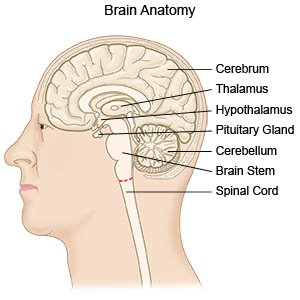Prolactinomas
Medically reviewed by Drugs.com. Last updated on Aug 4, 2025.
What is a prolactinoma?
A prolactinoma is a tumor in your pituitary gland. Your pituitary gland makes and releases the hormone prolactin, which helps produce breastmilk. A prolactinoma often decreases estrogen levels in women and testosterone levels in men. Most prolactinomas are not cancerous.
 |
What increases my risk for a prolactinoma?
The cause of a prolactinoma is often unknown. Your risk increases if you take medicines that increase your levels of prolactin. Your risk also increases if you are pregnant or breastfeeding, have hypothyroidism, or previously had a chest injury.
What are the signs and symptoms of a prolactinoma?
Signs and symptoms often occur if your prolactinoma is large and if you have abnormal hormone levels. You may have any of the following:
- Decreased desire for sex
- Increased fatigue
- Headaches, blurry vision, or poor peripheral vision
- Problems thinking, remembering, or moving parts of your body
- Milky discharge from your nipples
- Infertility
- Erectile dysfunction in men or irregular or absent periods in women
How is a prolactinoma diagnosed?
- Blood tests are done to check prolactin and other hormone levels in your body.
- CT or MRI scans may be done to look for a prolactinoma in your brain. You may be given contrast dye to help the tumor show up better in the pictures. Tell the healthcare provider if you have ever had an allergic reaction to contrast dye. Do not enter the MRI room with anything metal. Metal can cause serious injury. Tell the healthcare provider if you have any metal in or on your body.
- A visual field test checks your peripheral vision.
How is a prolactinoma treated?
- Medicine may be given to help lower your prolactin level and balance other hormones in your body.
- Radiation may be done to stop tumor cells from growing or shrink the tumor.
- Surgery may be done to remove your tumor.
When should I contact my healthcare provider?
- You have trouble getting or keeping an erection.
- Your menstrual period stops or becomes irregular.
- You have questions or concerns about your condition or care.
When should I seek immediate care or call 911?
- You have a severe headache and a stiff, painful neck.
- You have sudden trouble seeing or a hard time moving your eyes from side to side.
- You feel faint or confused.
- You have new or increased trouble moving parts of your body.
- You have a seizure.
Care Agreement
You have the right to help plan your care. Learn about your health condition and how it may be treated. Discuss treatment options with your healthcare providers to decide what care you want to receive. You always have the right to refuse treatment. The above information is an educational aid only. It is not intended as medical advice for individual conditions or treatments. Talk to your doctor, nurse or pharmacist before following any medical regimen to see if it is safe and effective for you.© Copyright Merative 2025 Information is for End User's use only and may not be sold, redistributed or otherwise used for commercial purposes.
Further information
Always consult your healthcare provider to ensure the information displayed on this page applies to your personal circumstances.
